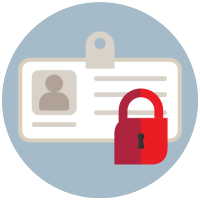Identity theft
Identity theft is the act of deliberately masquerading as another person for financial or personal gain. Cybercriminals use a variety of techniques to obtain personally identifiable information (PII) to take fraudulent financial steps in another individual’s name, such as applying for loans or credit cards, or opening bank accounts. Identity theft continues to rise as our world becomes more and more technologically advanced, meaning our personal information is spread out across the many devices we own, most of which are vulnerable to attacks.
Identity protection includes actions taken to limit exposure of PII online. The focus is good online hygiene – that is, habits to help keep you safe and secure online. Fortunately, many of these habits lessen the likelihood of identity theft, while paid service options can also help monitor your identity footprint across the web.

- Secure your personal information and shred confidential information that is no longer needed.
- Secure devices with up-to-date antivirus systems.
- Think before you click! Do not open attachments or links from emails or navigate to suspicious sites.
- Limit what you share on social media. Oversharing personal information online can allow cybercriminals to identify potential passwords, answers to common security questions or locations where you bank.
- Regularly review financial statements and credit reports.
- Consider signing up for an identity protection service that proactively monitors your identity footprint.